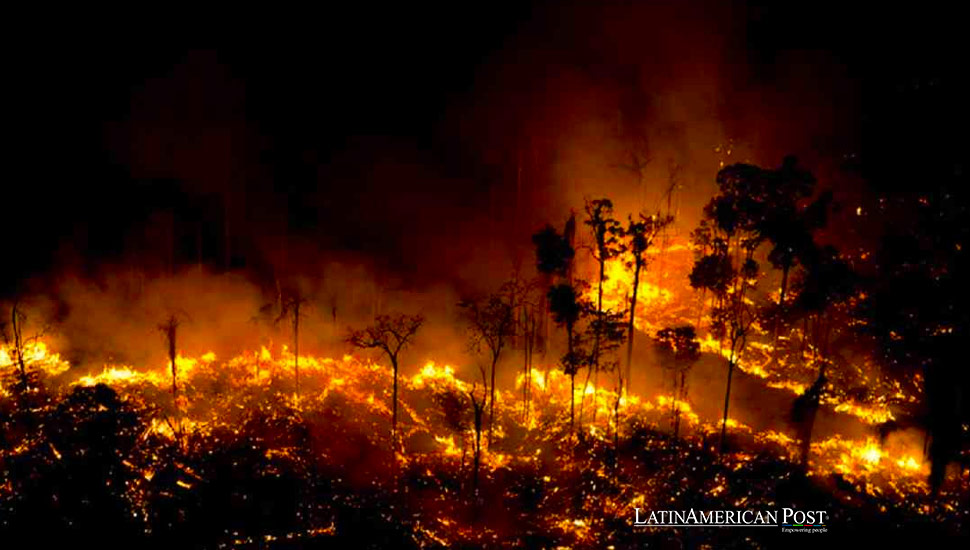Brazil’s Pantanal Faces Devastating Wildfires Amid Climate Crisis

Wildfires are ravaging Brazil’s Pantanal, the world’s largest tropical wetland, with nearly 32,000 hectares destroyed. The intensity of this year’s fires, fueled by high winds and low rainfall, has prompted a state of emergency in Mato Grosso do Sul.
Brazil’s Pantanal, the world’s largest tropical wetland and a biodiversity hotspot, is facing devastating wildfires. This critical ecosystem, home to jaguars, giant anteaters, and giant river otters, is threatened as flames consume vast swathes of land. Local media report that the fires in Mato Grosso have already destroyed close to 32,000 hectares of Sul.
Climate experts are raising alarms, noting that this year’s wildfire season has started earlier and is more intense than previous years. The ferocious fires, driven by high winds and exacerbated by an arid season, are proving difficult for firefighters to control.
According to Brazil’s National Institute for Space Research (INPE), the number of wildfires recorded from the start of the year until June 9th is 935% higher than the same period last year. This dramatic increase is particularly concerning given that the peak season for wildfires typically begins in July. Mato Grosso do Sul state authorities declared an environmental state of emergency in April, citing the exceptionally low levels of rainfall that have created ideal conditions for the fires to spread.
In 2020, the Pantanal experienced its worst year on record, with about 30% of the region consumed by fire. This year is on a similar trajectory, surpassing the number of previous fire outbreaks. Between January 1st and June 9th, 2023, 127 fires were reported. In the same period this year, that number has skyrocketed to 1,315.
Vinicius Silgueiro from the local NGO Instituto Centro da Vida expressed grave concerns to Reuters, stating, “What is most worrying is that even in the rainy season, we had this increase in fires.” Silgueiro warns that the situation will likely deteriorate further as the region heads into the peak of the dry season in August and September.
Impact on Biodiversity and Local Communities
The Pantanal is renowned for its rich biodiversity, hosting numerous endangered species and serving as a critical habitat for wildlife. The ongoing fires pose a severe threat to this delicate ecosystem. Jaguars, which rely on the dense vegetation for cover and hunting, are particularly vulnerable. The fires destroy their habitat and reduce prey availability, further endangering their survival.
The giant anteaters and giant river otters, unique to this region, face similar threats. The fires’ loss of habitat and food sources could have long-term impacts on their populations. Additionally, the fires disrupt the breeding and nesting cycles of various bird species, potentially leading to declines in their numbers.
Local communities are also profoundly affected. Many residents of the Pantanal depend on the natural environment for their livelihoods, including fishing, ecotourism, and agriculture. The fires destroy crops, reduce fish stocks, and deter tourists, leading to economic hardships. Furthermore, the smoke from the fires poses significant health risks, particularly for vulnerable populations such as older people and children.
Government and Community Response
In response to the escalating crisis, Brazil’s federal government has announced a collaborative effort with the state governments of Mato Grosso do Sul and the Amazon region to combat the wildfires. Environment Minister Marina Silva emphasized the importance of rapid response and preventive measures. “It is key to respond to fires more quickly while also doing more to prevent them from breaking out in the first place,” she stated.
The government’s plan includes increasing firefighting resources, enhancing surveillance and monitoring systems, and implementing stricter controls on activities that can lead to fires, such as illegal deforestation and agricultural burning. The aim is to create a comprehensive strategy that addresses immediate firefighting needs and long-term prevention efforts.
Local NGOs and community groups are also playing a crucial role. Organizations like Instituto Centro da Vida are working to support firefighting efforts, aid affected communities, and raise awareness about the importance of protecting the Pantanal. These groups advocate for more robust environmental policies and significant investment in conservation efforts.
Latin American Context
The wildfires in the Pantanal are part of a broader trend of increasing fire incidents across Latin America, driven by climate change, deforestation, and land-use changes. Fire outbreaks have similarly surged in the Amazon rainforest, causing widespread environmental and social impacts. These fires contribute to significant carbon emissions, exacerbating global climate change and affecting air quality across the continent.
The situation in Brazil indicates the challenges many Latin American countries face, where economic pressures and weak enforcement of environmental regulations often lead to unsustainable practices. The region’s ecosystems, including the Pantanal and the Amazon, are critical for local biodiversity and global ecological health.
International cooperation and support are essential to address these challenges. Countries worldwide have a vested interest in preserving these vital ecosystems and mitigating the impacts of climate change. Collaborative efforts, such as sharing technology, funding conservation projects, and implementing global agreements on environmental protection, can help Latin American nations build resilience against the increasing threat of wildfires.
Long-term Solutions and Future Outlook
The recurrent wildfires in the Pantanal highlight the urgent need for comprehensive and long-term solutions. Addressing the root causes of these fires requires a multifaceted approach that includes climate change mitigation, sustainable land management, and robust conservation strategies.
One crucial aspect is improving land-use practices. Promoting sustainable agriculture and forestry practices can reduce the risk of fires. This includes implementing agroforestry systems that integrate trees and crops, reducing the need for slash-and-burn techniques, and encouraging farmers to adopt fire-free land preparation methods.
Strengthening environmental regulations and enforcement is also vital. Ensuring that laws against illegal deforestation and land clearing are strictly enforced can help protect critical habitats and reduce the occurrence of fires. Additionally, providing support and incentives for landowners to preserve natural areas and engage in conservation activities can foster a culture of environmental stewardship.
Investing in scientific research and monitoring is essential for understanding fire dynamics and developing effective prevention strategies. Enhancing early warning systems, using satellite technology to monitor fire outbreaks, and researching fire-resistant plant species and ecosystem restoration techniques can improve fire management practices.
The devastating wildfires in Brazil’s Pantanal are a stark reminder of the urgent need for action to protect our planet’s most valuable ecosystems. The loss of biodiversity, the displacement of local communities, and the contribution to global climate change underscore the gravity of the situation. As the fires continue to rage, the collaborative efforts of governments, NGOs, and local communities offer a glimmer of hope.
Also read: Brazilian Left-Wing Tax Policies Are Inadequate Solutions for Economic Growth
We can work towards a future where the Pantanal and other critical ecosystems are safeguarded for future generations by addressing the immediate crisis and implementing long-term solutions. The challenge is immense, but the stakes are too high to ignore. The world must come together to combat the threat of wildfires and preserve the natural wonders that sustain life on Earth.





